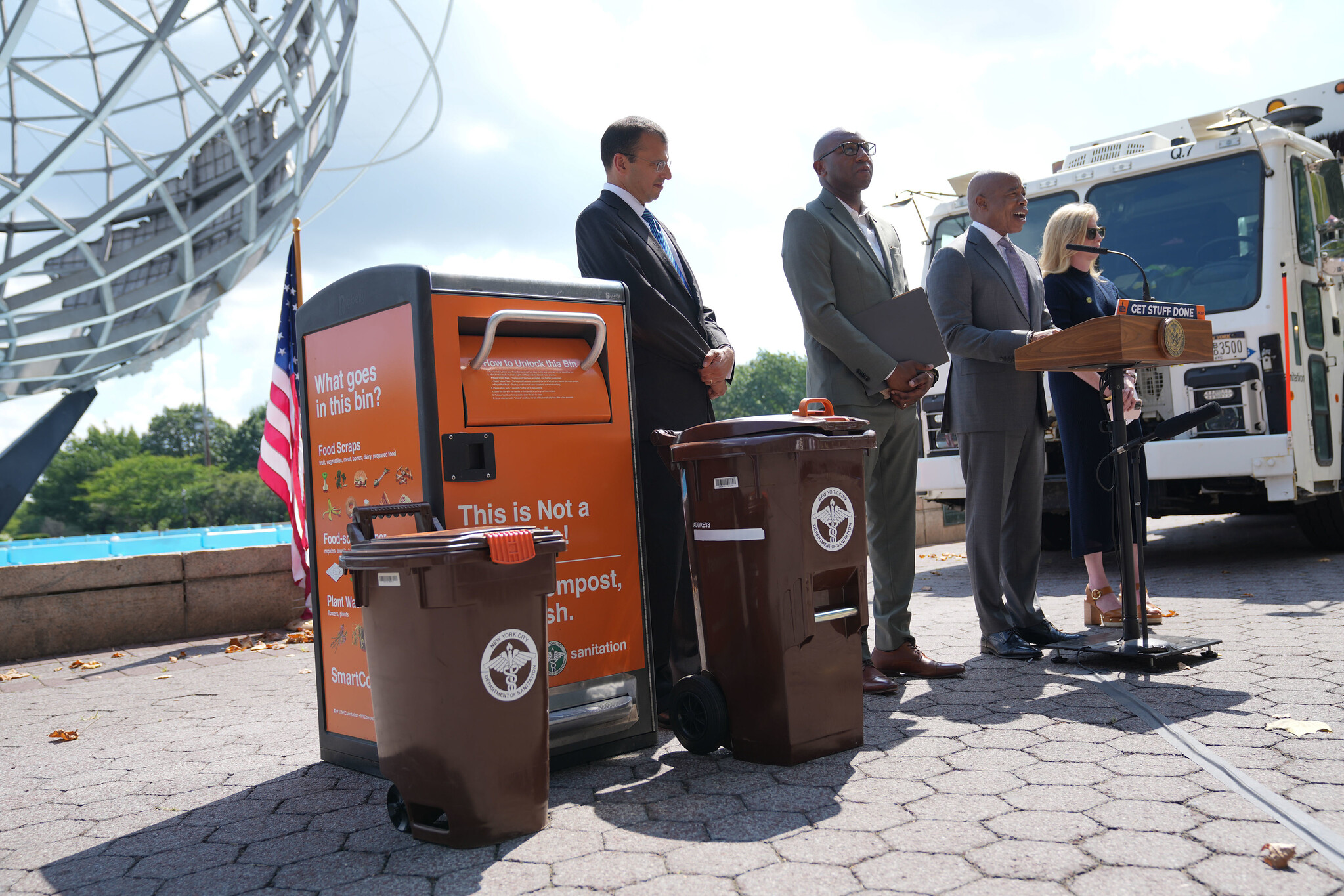Queens is getting its crap together — but slowly.
Mayor Adams's recently launched curbside compost collection for all of the World's Borough is already doing better than his predecessor's opt-in program, but residents have a long way to go to fill up their brown bins with more food and yard waste.
The Department of Sanitation picked up more than one million pounds of organics in Queens in the first two weeks since Adams rolled out weekly curb collection to every address in the borough, the agency's chief said last week.
"We feel really good about it," DSNY Commissioner Jessica Tisch said on WNYC's Brian Lehrer Show on Oct. 18. "The plan and the hope is to be able to expand to other parts of the city, but we really want to get it right first in Queens before we expand."
The initiative began on Oct. 3, allowing every Queens resident to have their organics collected every week without having to sign up — a change from former Mayor Bill de Blasio's program which only covered a few neighborhoods.
But it's not perfect: The one million pounds that DSNY collected in the first two weeks is a tiny fraction of the heaps of organic material Queens households throw in the garbage every day (and shouldn't). Borough residents throw out about 2.2 million pounds of organics every day, while the new curbside program captured an average of 71,400 pounds of organics — just 3 percent of what is possible.
However, Queensites have been setting out on average about double the weight of organic waste per community district compared to the seven areas in Brooklyn, Manhattan, and the Bronx enrolled in the old program, according to a DSNY spokesperson.
"Pretty amazing to see how successful a program can be when it hits every address," said Belinda Mager.
A civically active Queens resident who has been composting for 20 years said the city must better educate the public about why organics separation matters and make it mandatory, as is already the case for recycling.
"If it’s mandatory and required — and you teach people how to do it — it will start to grab on, but if you keep starting and stopping it people will be confused," said John Maier, a Ridgewood resident and staffer on Queens Community Board 5.
"We put ours out the first week it was available," Maier said. "Not enough of my neighbors put it out though."
Commissioner Tisch said that New Yorkers were not ready for that yet, since only half of city residents have ever had access to a curbside organics collection program.
"Food waste separation requires complex cultural change that cannot in its first instance be strictly punitive," said Tisch at a June 15 Council hearing. "You have to give people voluntary access to curbside food waste collection and allow them to develop the muscle memory of separating out their food waste material before we contemplate mandatory programs."
Organic material that ends up in landfills rots and emits the highly harmful greenhouse gas methane. When the city keeps the scraps separate, officials can convert it into nutritious compost to feed the city's parks. It also cuts costs to ship all that material to dumps outside the five boroughs.
"It’s not like DSNY isn’t trying, I just think they should talk about it more about the cost for the city of burying this waste," Maier said. "We could be giving back to the earth rather than hide our shit under the carpet."
The Council's Sanitation Committee Chair Sandy Nurse (D-Brooklyn) said the city must also make clear that organics collection is here to stay.
"It’s gonna take a minute for people to get it into their daily rhythm of their life and their week that they can separate their food scraps, [and say] 'I can fully invest in it because I know it’s here to stay,'" said Nurse, who also founded the bike-powered food waste hauling and composting service BK ROT before running for office.
The current Queens pilot program is set to pause for the winter on Dec. 23 after 59 weekdays in operation, before relaunching in the spring
Former Mayor Bill de Blasio halted pickups for nearly a year amid Covid-19 budget cuts in 2020, and only brought it back last year for a handful of community boards in largely wealthier parts of the city.
A Council bill from April — with a veto-proof majority — would create a citywide curbside organics programs for all residential buildings, and Nurse wants the law to force DSNY's hand to go beyond pilots.
"Normalizing it, having it happen all the time every week, no starting and stopping — a consistent program that is codified into law that has to be carried out by the DSNY, is in my mind the most significant step in increasing participation rate," she said.
It is up to Speaker Adrienne Adams to bring the bill up for a vote, and she is one of the 42 members signed on to the proposal. A spokesperson for the speaker said she would advance the proposed law as part of a larger zero waste package "soon."
"The Speaker is committed to a zero waste package of bills being passed soon, and the Council is currently working on it," said Walter Chi.
City Hall spokesperson Kate Smart said Mayor Adams is "reviewing" the bill.






